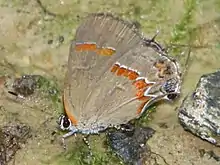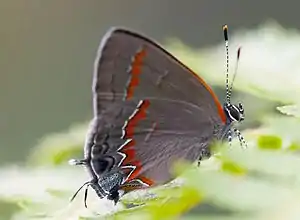Red-banded hairstreak
The red-banded hairstreak (Calycopis cecrops) is a butterfly native to the southeastern United States. It feeds on fallen leaves of sumac species and other trees. Its size ranges from 0.9–1.25 inches (23–32 mm). It lives near coastal areas.
| Red-banded hairstreak | |
|---|---|
 | |
| Scientific classification | |
| Kingdom: | |
| Phylum: | |
| Class: | |
| Order: | |
| Family: | |
| Genus: | |
| Species: | C. cecrops |
| Binomial name | |
| Calycopis cecrops Fabricius, 1793 | |

Red-banded hairstreak
Its genome was sequenced in 2016.[2] It has a false "head" that helps it avoid predators. In a 2012 experiment, C. cecrops was exposed to a jumping spider, Phidippus pulcherrimus, which researchers found to be a "very efficient strategy in deflecting attacks."[3]
References
- "NatureServe Explorer 2.0 Calycopis cecrops Red-banded Hairstreak". explorer.natureserve.org. Retrieved 3 October 2020.
- Cong, Qian; Shen, Jinhui; Borek, Dominika; Robbins, Robert K.; Otwinowski, Zbyszek; Grishin, Nick V. (28 April 2016). "Complete genomes of Hairstreak butterflies, their speciation and nucleo-mitochondrial incongruence". Scientific Reports. 6 (1): 24863. Bibcode:2016NatSR...624863C. doi:10.1038/srep24863. PMC 4848470. PMID 27120974.
- Sourakov, Andrei (April 2013). "Two heads are better than one: false head allows Calycopis cecrops (Lycaenidae) to escape predation by a Jumping Spider, Phidippus pulcherrimus (Salticidae)". Journal of Natural History. 47 (15–16): 1047–1054. doi:10.1080/00222933.2012.759288. S2CID 84454608.
This article is issued from Wikipedia. The text is licensed under Creative Commons - Attribution - Sharealike. Additional terms may apply for the media files.
